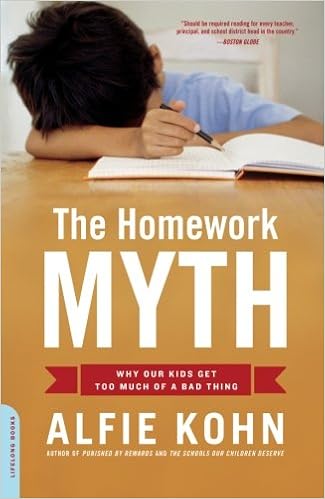As a teacher of many different age levels through the years, I've always struggled with homework. Not just giving it, but also grading it, keeping track of it, differentiating, and assigning relevant work to do after school hours. After reading Alfie Kohn's book The Homework Myth, I felt vindicated, relieved, and more than a little frustrated with the homework situation in most schools (and certainly in my own).
I've struggled for years with the homework dilemma. Most parents think it's a necessary "tool" to ensure their child is keeping up with a certain workload, or even helping that child get ahead. From kindergarten through grade 5, I have heard many arguments for homework, but not one of them has changed my mind into believing it's healthy and important for our children to do school work outside of the classroom at such a young age. I don't blame parents for not being familiar with the research, but it's a delicate subject that deserves attention and more than just anecdotal justification.
Since we all know the arguments for homework, I will list three arguments against it. (These are relevant for elementary-age students.) You can read more about the following arguments in Alfie Kohn's book.
 1. Homework provides "practice" that is either too easy or too difficult. If it's easy enough for students to breeze through, why do they need to practice that skill? They already know it. If it's too difficult, why are they being asked to do it outside the classroom, where they are more likely to struggle on their own or to begin practicing incorrectly? Not to mention the feeling of dread that ensues from the school work being too difficult.
1. Homework provides "practice" that is either too easy or too difficult. If it's easy enough for students to breeze through, why do they need to practice that skill? They already know it. If it's too difficult, why are they being asked to do it outside the classroom, where they are more likely to struggle on their own or to begin practicing incorrectly? Not to mention the feeling of dread that ensues from the school work being too difficult.2. Homework doesn't foster independence or responsibility. It fosters obedience, maybe, but not responsibility. Responsibility means students have a choice... in what they're doing, when, and how. Let's face it, most homework assignments don't offer any of these options. Not to mention, if homework truly helped students develop independence, we would see fewer incomplete, forgotten, misplaced, or mangled homework as the year progressed... right?
3. Students spend the entire day at school, for the most part doing as they're told and following the instructions of someone else. When they leave the building, they should be doing the things they choose. After all, why am I so presumptuous as a teacher to tell anyone what they should be doing outside of school with their family and friends? We all need down time.
Having said these things, I do acknowledge that some practice outside of school can be beneficial... and even necessary. For example, reading outside the classroom has a positive impact on fluency, accuracy, expression, and comprehension. Although I encourage a love of reading throughout the school day, I also provide books for students to take home and read. Reading is similar to playing the piano or practicing a sport--the more often you do it, the better you get.
I know homework is a very controversial topic, and we're constantly striving to meet the needs of all of our students. I'm only suggesting that we take a close look at our practices and have discussions about the types of homework we assign (if we must). I would love to hear your thoughts!

No comments:
Post a Comment